Thailand is one of the most popular countries in Asia. The reason for this is obvious: dreamlike islands, beautiful beaches, delicious food, affordable prices, numerous leisure activities, a great climate, and friendly locals. Backpacking in Thailand is more popular than ever. We have also spent a lot of time in the country and can only recommend a trip there to everyone. Of course, some regions are quite overcrowded, but there are also quieter corners where you can really enjoy your Thailand vacation. Today, we have all the important information you need for your backpacking trip to Thailand.
- Entry & Visa
- Arrival & Onward Travel
- Health & Vaccinations
- Climate & Best Time to Travel
- Money & Finances
- Language & Religion
- Getting Around in Thailand
- Booking Accommodation
- Backpacking in Thailand & Safety
- Food & Shopping
- Internet & Cell Phone
- Backpacking in Thailand – Highlights
- The Best Travel Guides
Entry & Visa
You generally do not need a visa to enter Thailand. You will receive a stamp in your passport upon entry (“Visa on Arrival“) and may then stay in the country for 30 days. If you enter by land, unfortunately, it is only 15 days. Your passport must be valid for at least 6 months upon entry. For your visa-free stay, you should be able to present a return ticket. On the plane, or at the airport at the latest, you must fill out a registration card with your personal information. This entry form consists of an “Arrival Card” and a “Departure Card.” You must submit your entry card and keep your exit card safe until your departure.
If you know in advance that you want to stay in Thailand for a longer period, you should apply for a visa at an embassy. You can choose between 2 and a maximum of 6 months (Tourist Visa M). The visa costs around €30 for a single entry and €60 for two entries. The good thing is that you can extend this visa for another 30 days at an immigration office on site. You can also extend the visa on arrival once for 30 days (cost: around €50). To do so, you simply need to go to an immigration office (e.g., Bangkok, Koh Samui, Phuket). More information here: Entry and Visa Thailand.
Arrival & Onward Travel
Flying is no longer such an expensive proposition. From Germany, you can easily fly non-stop to Bangkok or Phuket. You can now choose between many airlines. From Frankfurt, for example, you can fly with Lufthansa, Condor, or Thai Airways. Thai Airways flies directly from Munich once a week. Austrian Airlines flies from Vienna, and Swiss Air from Zurich. Eurowings flies directly from Cologne to Bangkok or Phuket at a great price.
If you don’t mind a layover, you can fly from almost any airport in Germany. You’ll stop at the airline’s home airport. Make sure this stop isn’t too long. Airlines include Oman Air, Emirates, Etihad, and Qatar Airways. We always search for flights on Skyscanner first and then double-check the connection on Momondo and/or Kayak. It’s often even cheaper to book directly on the airline’s website.
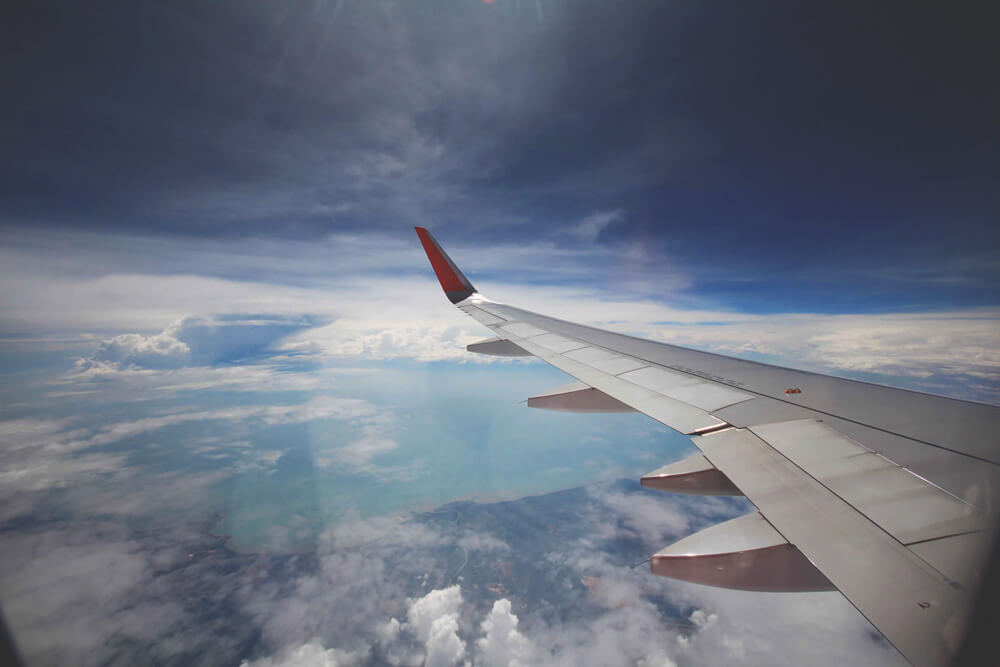
From many cities in Thailand, you can fly quickly and, above all, cheaply to another country (e.g., Malaysia, Indonesia, Vietnam, and many more). Low-cost airlines (e.g., Air Asia) offer plane tickets for as little as €5 to €10. You can also easily travel to neighboring countries by bus. To book tickets, we recommend the 12Go.de* website. There you’ll find all the information you need about prices and times for buses, trains, ferries, and minibuses.
Health & Vaccinations
You should inform yourself about vaccinations and regulations before your trip to Thailand. It makes a difference whether you are traveling in the north of Thailand or, for example, in the south on one of the many islands. It is best to seek advice from a tropical institute. Generally, vaccinations are not necessary for entry into Thailand. However, a tetanus booster is recommended, as is immunization against hepatitis A. Depending on the length of your trip and your travel style, you should also get vaccinated against rabies, typhoid, and Japanese encephalitis. Immunization against hepatitis B is also recommended.
Don’t forget your international health insurance. Your health is paramount; anything can happen. Outside the EU, treatment can quickly become expensive, so you should protect yourself in advance. There are numerous providers where you can take out insurance for €8 to €10 per year. This insurance usually covers you for a trip of up to 6 weeks at a time. You can find detailed information on travel insurance here.
Climate & Best Time to Travel
Different travel periods are recommended depending on the region in Thailand. If you’re traveling to Northern Thailand, you can expect little rain and warm temperatures, especially between November and February. Thanks to the northwest monsoon, temperatures often reach over 33 degrees Celsius. The rainy season in northern Thailand is from June to October.
In Central Thailand (Bangkok, Koh Chang, etc.), the rainy season is from May to October. But that doesn’t mean it rains cats and dogs every day. At 28 degrees Celsius, it’s certainly not cool. However, if you prefer drier weather, you should prefer the months of December to March.
In Southwest Thailand (Phuket, Krabi, Koh Lanta, Khao Lak, and others), the months of December to April are recommended. Most rain falls from May to October. Southeast Thailand (Koh Samui, Koh Tao, Koh Phangan, etc.) is especially recommended during the months of January, February, March, April, July, August, and September. Most rain is expected from July to September. However, this can always change and differs from year to year. More information here: Best Time to Travel to Thailand.
Money & Finance
In Thailand, you can easily withdraw money from ATMs almost everywhere. We advise against carrying too much cash and valuables with you. In Thailand, you pay with the “Thai Baht” (THB). Currently, you get around 46 THB for 1 €. Depending on your credit card, you don’t even have to pay fees at ATMs in Thailand. However, the usual €5 per withdrawal is normal. We’ve put together a comparison of the best travel credit cards for you.
It’s best to get some money directly at the airport. You can also exchange money at exchange offices, but usually at a worse rate. Just in case, you should always carry a few euro bills with you, and US dollars are even better. You can exchange these almost anywhere. Warning: Unfortunately, many ATMs are no longer as secure. We were victims of a scam ourselves. You can find all information about security and credit cards here.
Thailand is a very affordable travel destination. Whether accommodation, food, scooters, internet, or shopping – everything is really cheap here. You can get good bungalows on the beach with fans for as little as €15 a night, comfortable hotel rooms for €20. In the markets, you can usually get a delicious warm meal for just €1. A pack of cigarettes only costs around €2, and freshly squeezed fruit juice €0.50. On average, we spent just €42 per day for two people (accommodation, food, drinks, sightseeing, transport, internet, and other expenses). Of course, there’s no limit; it can even be cheaper. More about this here: Costs for Thailand.
Language & Religion
In Thailand, “Thai” is spoken. And as if the language weren’t difficult enough, the characters are also different from ours. The Thai script belongs to the abugida script, but you can usually find European characters directly underneath. English is also spoken in most tourist destinations, so you don’t really have to worry about that.
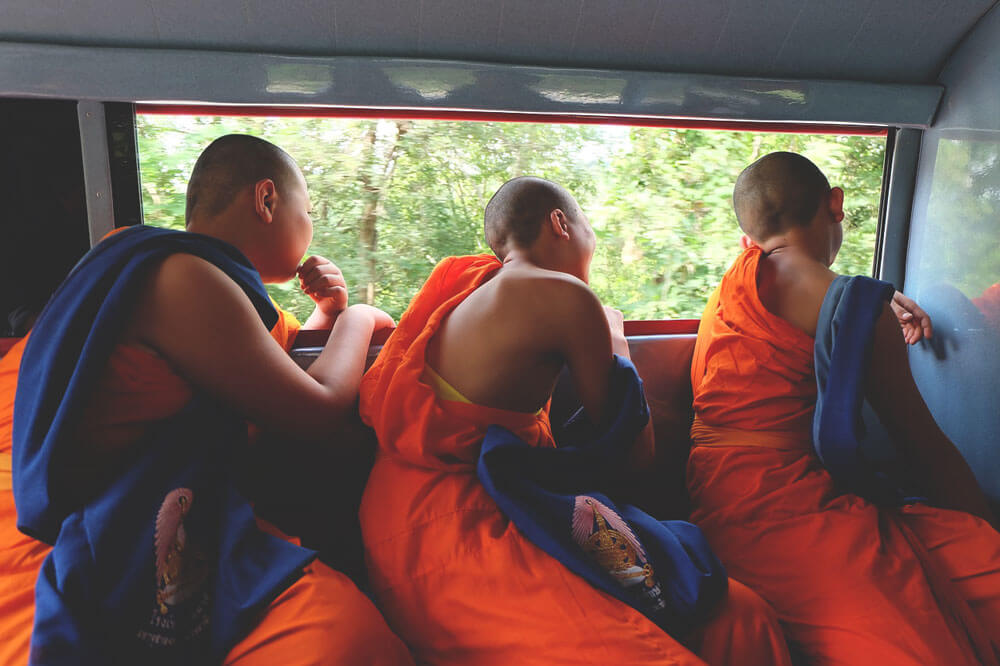
The dominant religion in Thailand is Theravada Buddhism, which is practiced by approximately 94% of the population. Predominantly in southern Thailand, there is also a small number of Muslims (5%), 0.6% Christians, and about 65,000 Hindus (mostly Indians). It’s best to familiarize yourself with the religion a little before your trip. This way, you can avoid any potential faux pas and awkward situations. Since you’re a guest in a foreign country, you should behave accordingly and respect the cultures.
Getting Around in Thailand
As in almost every other country, you have various options for getting around in Thailand. Longer distances can be covered inexpensively by plane. For example, we flew from Phuket to Chiang Mai, or from Bangkok to Surat Thani, or from Chiang Mai. Flight tickets usually cost less than €30. Flights to neighboring countries are also really affordable and highly recommended. We’ve never had a bad experience with Air Asia.
Most backpackers, however, travel through Thailand by bus. This mode of transportation is also widespread. Thais will take you to virtually every corner of the country and neighboring countries. Tickets are very cheap, and the buses are relatively safe and well-equipped. You can book tickets, times, and prices here: www.12go.com*. There are small travel agencies almost everywhere in Thailand where you can also book tickets.
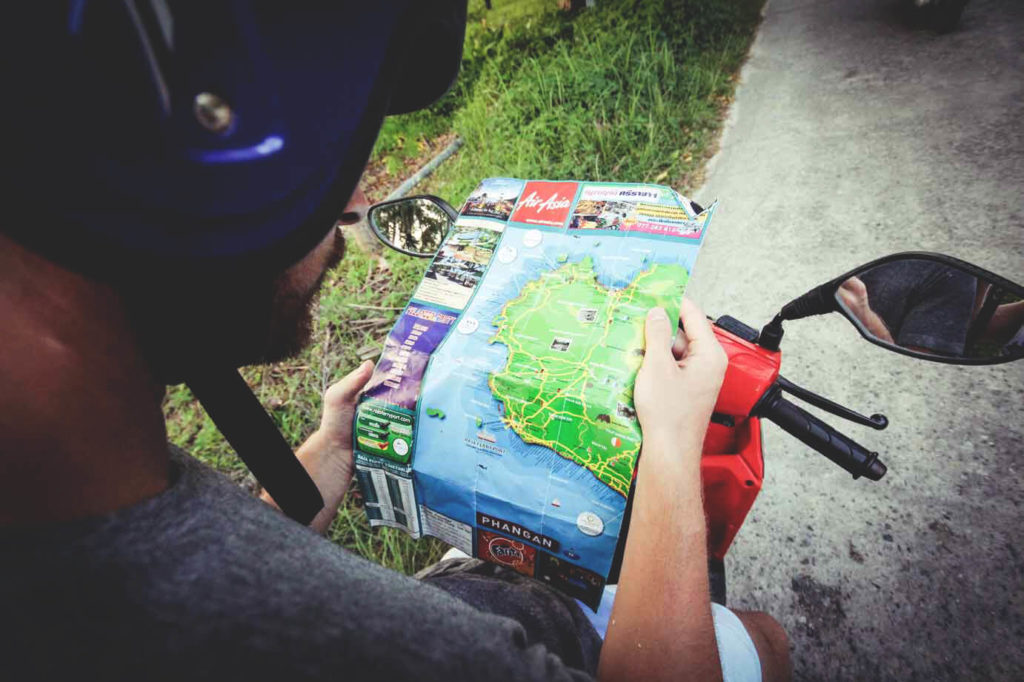
You can also cover some distances in Thailand by train. For example, you can travel from Bangkok to Chiang Mai or south to Surat Thani (from there to the islands). However, it’s cheaper to take the buses. We often traveled by the somewhat more expensive minibuses. Unfortunately, it was usually the only option, and also somewhat uncomfortable. We also encountered drivers who drove way too fast on a few occasions.
To get to the island, you usually have to take the ferry (or smaller boats). From Surat Thani, you can get to Koh Samui, Koh Phangan, or Koh Tao cheaply. From Krabi, you can sail to Koh Lanta, and from Phuket, for example, to the islands of Koh Yao Yai and Koh Yao Noi. It’s best to buy tickets locally at one of the many small agencies. Speedboats and smaller ferries also often travel between the islands.

We rented a scooter almost everywhere. For us, it’s simply part of the experience and gives us a great feeling of freedom. Exploring an island on a scooter is incredibly fun. We usually only paid €4 to €5 a day. Document all defects thoroughly and don’t get ripped off. You should also never leave your passport as a deposit! In the event of an accident, you won’t get it back until you’ve repaired the damage. Tuk-tuks are a cheaper alternative to taxis. Here, too, you should negotiate the price in advance!
Booking Accommodation
Thailand is a paradise for backpackers. In addition to food, shopping, and transportation, accommodation is also really cheap. We mostly booked through Booking.com, and occasionally through Airbnb. The hostel scene isn’t particularly well-developed; on the islands, you tend to stay in small bungalows or resorts. On Koh Phangan, for example, we usually paid only €10-15 for a bungalow. You can find comfortable hotel rooms or even apartments for €20 a night (even cheaper).
You should be aware that the standard in Thailand is different than in Germany. In a simple bungalow, you usually only have a bed, a fan, and a toilet with a shower. You can expect Western standards if you pay a little more. Nevertheless, even the inexpensive backpacker accommodations are usually clean and adequate. In Bangkok, we didn’t pay a fortune even for a luxurious 5-star hotel. We usually had really great apartments for less than €20 to €25 a night.
Backpacking in Thailand & Safety
Thailand is generally a safe country – unrest occurs all over the world. As long as you travel with common sense and follow certain rules, you shouldn’t have any problems. Don’t annoy people unnecessarily, keep an eye on your belongings, and respect the locals and other tourists. It’s best not to carry valuables with you; pickpockets are everywhere. The situation in the country can change quickly. Therefore, you should check the Federal Foreign Office website before your trip.
You should stay away from any kind of drugs. In the Land of Smiles, this is certainly not something to be taken lightly. If you are caught with drugs, you can even face the death penalty. If you’re very lucky, you can bribe the officials and get away with a “lesson.” But don’t count on it. Also, be careful when withdrawing money from ATMs and hide your valuables in your accommodation. When renting a scooter, boat, or jet ski, you should always document any defects. You can easily get ripped off here and can pay a lot of money.
Food & Shopping
Food: Thailand is one of the best countries when it comes to food. We have rarely enjoyed eating and feasting in any other country as much as we did in Thailand. Not only does it taste great, it’s usually also super cheap. You can find street food almost everywhere. Of course, you can also find Western cuisine in Thailand, including pizza, burgers, pasta, and the like. Most Thai dishes are served with noodles or rice.
This usually comes with chicken, vegetables, or fish. You usually pay only €1 for a meal. You can get fresh fruit shakes for around €0.50, and sweet pastries for just a few cents. You can also eat quite cheaply in local restaurants; it gets more expensive in the tourist centers and Western establishments.
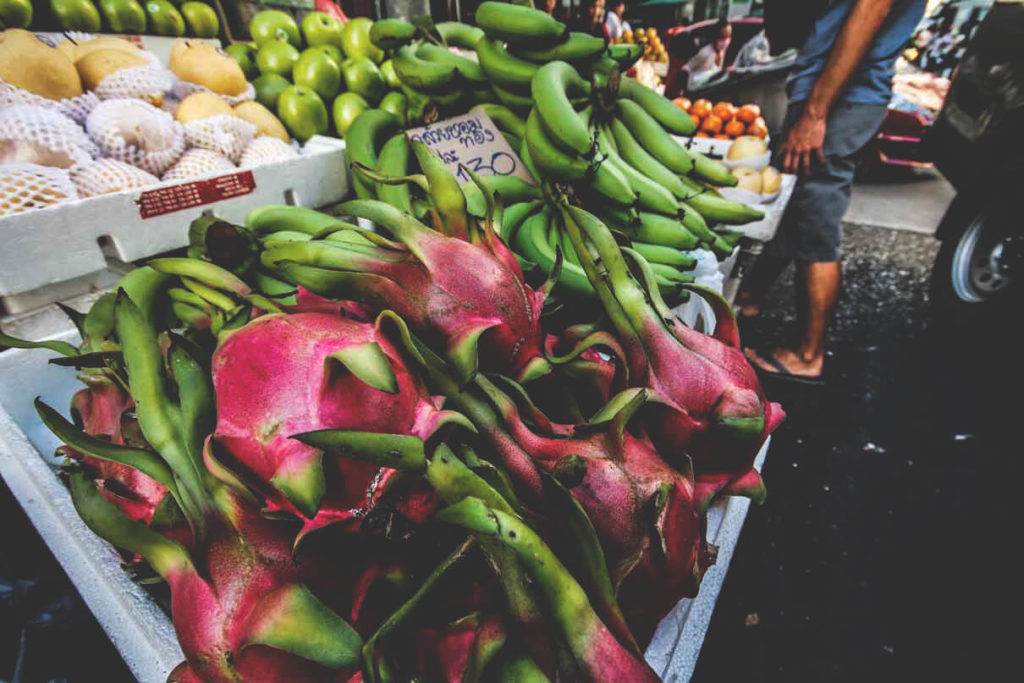
Shopping: In Thailand, you can find everything your heart desires. Modern shopping malls, colorful markets, small shops, supermarkets (Big C, Makro, etc.) and kiosks (7-Eleven). At the popular street markets, you can always eat and shop cheaply. You can get a T-shirt, a pair of pants, or sunglasses for around €2 to €5. Here, you can bargain, as Thais often want three or four times your price. There are also night markets almost everywhere in Thailand, where you can feast and shop in the evening.
Internet & Cell Phone
We never had any problems with the internet in Thailand either. On the islands, it was never as stable as on the mainland, for example. Nevertheless, we had access to the internet anytime and anywhere. Most accommodations, cafes, malls, and restaurants offer free Wi-Fi.
You can also get a SIM card with a data allowance. There are three major mobile phone providers in Thailand: True Move, dtac, and AIS. All offer plans that usually include credit for calls and data. You can get these prepaid cards at airports, malls, or even at 7-Eleven.
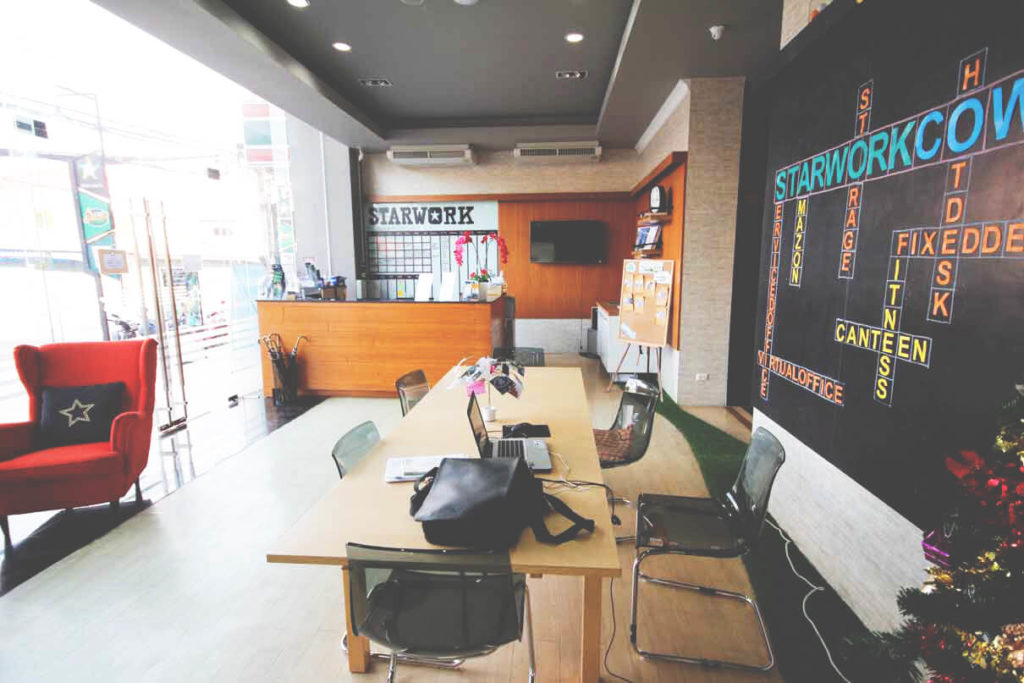
The employees will usually help you set up your SIM card. You can get 1 gigabyte of data for just €7. Can’t complain, can you? Calling or texting generally only costs a few cents in Thailand. You can easily reload your card once you’ve used up all your credit. Tip: There are also many co-working spaces in the larger regions and on some islands.
Backpacking in Thailand – Highlights
Now we finally come to the really exciting part of the backpacking trip through Thailand. The country has countless highlights; there’s truly much to see and do. Every trip to Thailand usually includes a detour to Bangkok. Opinions differ here: some love Bangkok, others hate it. We personally don’t like Bangkok either, but that’s a matter of taste.
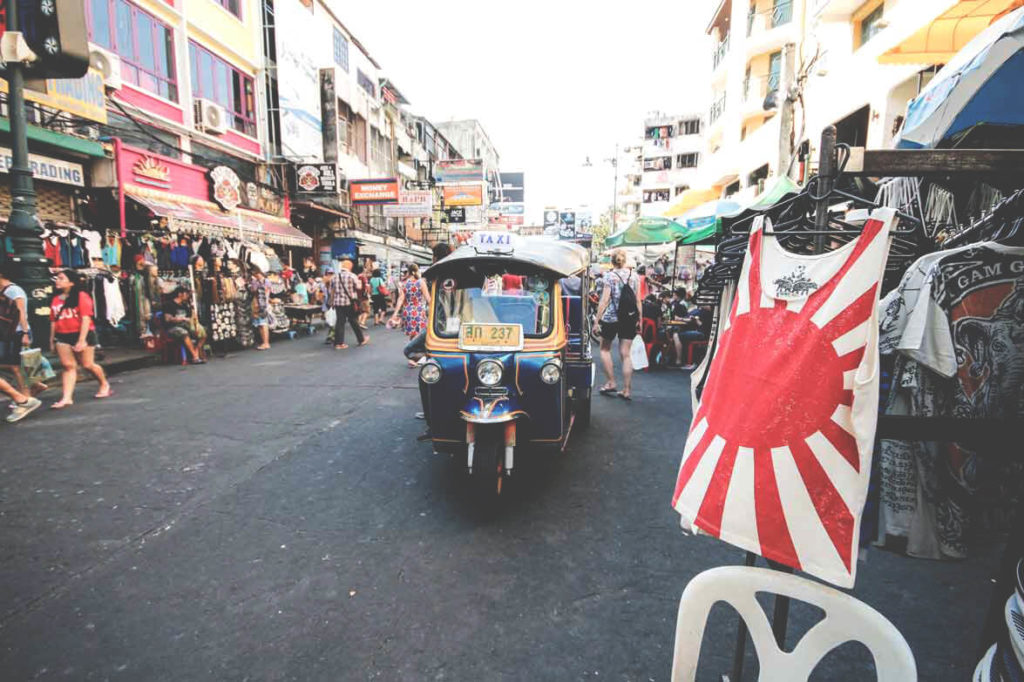
Digital nomads, in particular, often head to Chiang Mai. We also spent a week there and took a closer look at the city. We had a great time there, but we still don’t understand the hype surrounding Chiang Mai. But there are cool markets and truly amazing temples there. From there, it’s not far to Pai.Other places: Kanchanaburi, Ayutthaya, Chiangrai, Thaton, Petchaburi, Hua Hin, Cha Am, Ban Krut, and more.
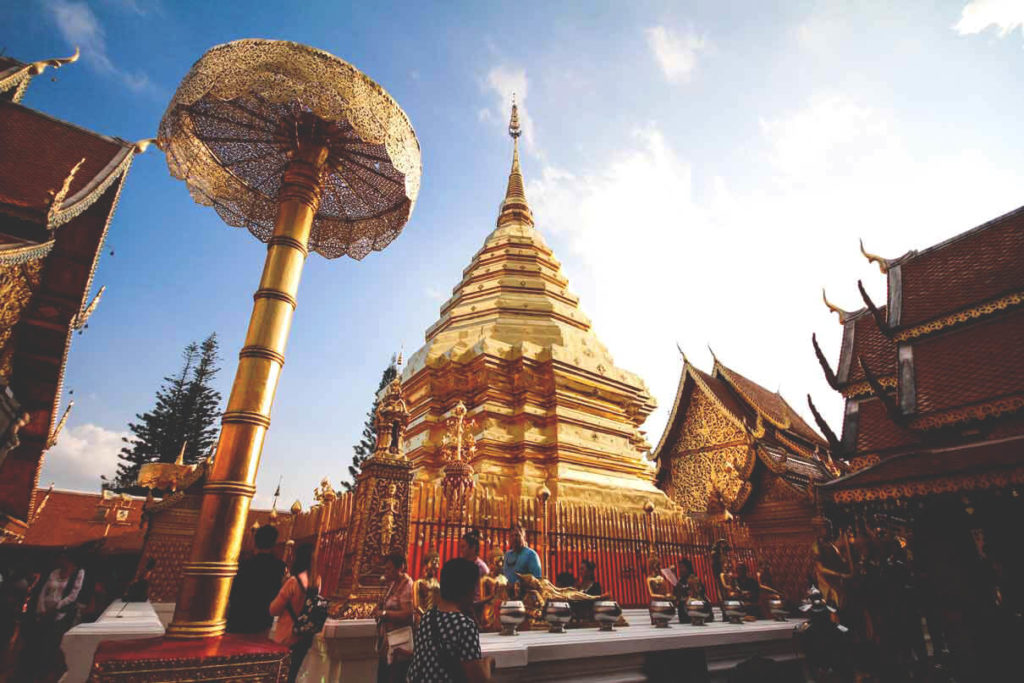
There are also countless beautiful islands in Thailand. We spent almost a month on the island of Phuket, with a detour to Koh Yao Noi. We also spent time in Khao Lak, Krabi, and Koh Lanta. Thailand also has Koh Chang, Koh Payam, Koh Phi Phi, Koh Samet, Koh Lipe, and many more. We were on Koh Samui, Koh Phangan and also Koh Tao.

We did our first dive near Koh Lanta, on the island of Koh Haa. It was a pretty cool experience. The underwater world is simply magnificent! We started from Koh Lanta with a German diving school. Backpacking in Thailand? Absolutely! The country is ideal for it and can be traveled easily and without problems. All you need is a valid passport, summer clothes, flip-flops, sunglasses, and a good mood. The rest will take care of itself.
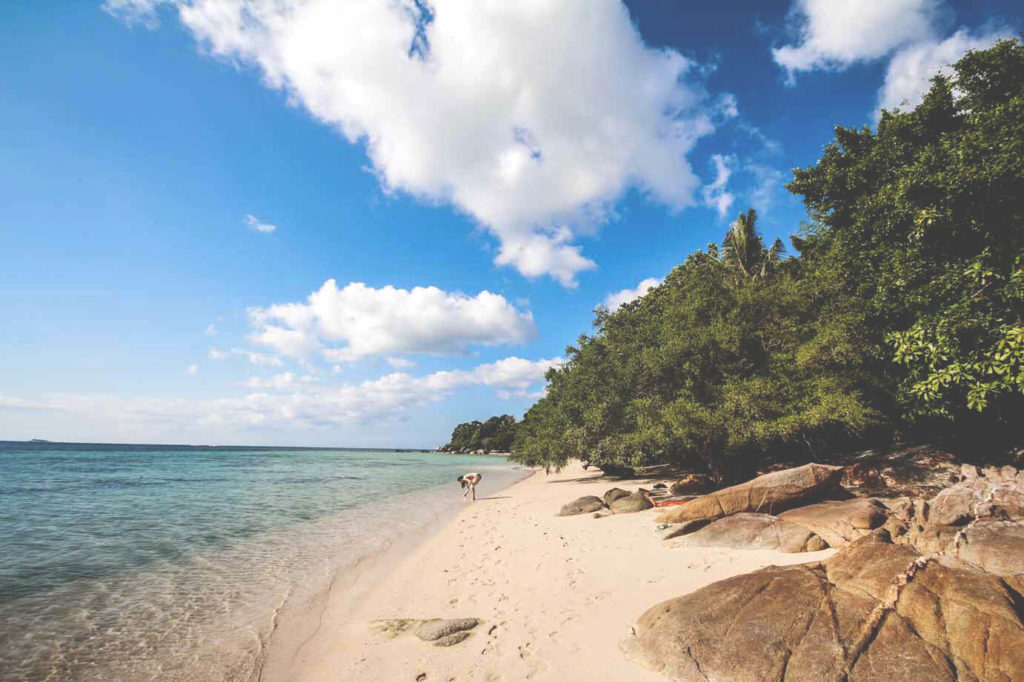
Book a cool tour in Thailand here and experience the country up close. Whether it’s a snorkeling tour, diving trip, temple visit, cooking class, or island hopping – at Get Your Guide you’ll find a huge selection:
The best travel guides
Want to learn more about Thailand so you’re well prepared for backpacking in Thailand? Then get Stefan Loose’s excellent Thailand travel guide. Here you’ll find absolutely every piece of information on almost 900 pages. Ferndurst’s book, “105 Reasons to Love Thailand,” is also highly recommended. It’s a travel guide with heart-pounding moments and insider tips. We also contributed a chapter. Therefore, we’d be delighted if you picked up this book (e-book and print) for your Thailand trip.
Want to keep up with all the latest news?
Feel free to follow us on Facebook, Instagram, or Pinterest. You can also reach us with a personal message there. We always try to respond as quickly as possible. Otherwise, you can also reach us by email at any time.